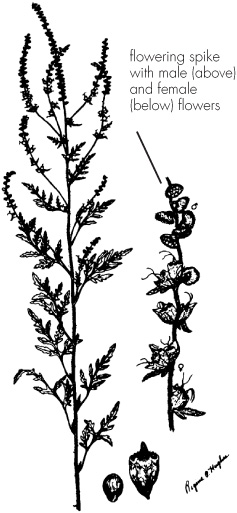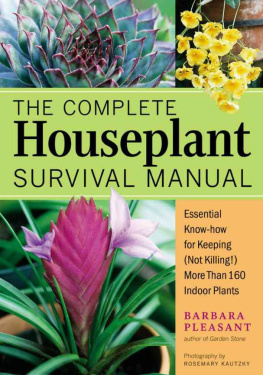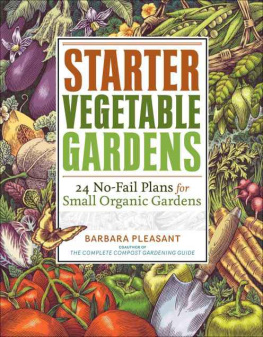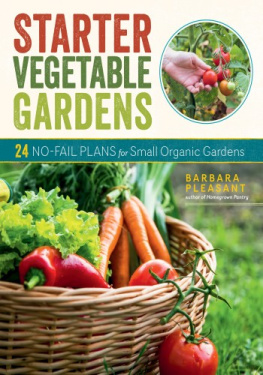Controlling Garden Weeds
Barbara Pleasant
Why Weeds?
Weeds are the plants gardeners love to hate. Through the ages, people have attempted to define weeds, always with inadequate results. Are they plants whose virtues have yet to be discovered (Walt Whitman), guardians of the soil(Joseph Cocannouer), or something equally nice, or are they sly thieves that steal the soils resources and gardeners precious time? Perhaps they can only really be defined from a practical point of view: Weeds are any plants that insist on growing where you dont want them to grow.
It so happens that unwanted trespassers in your garden tend to be the same plants time after time. These true garden weeds are special, for they thrive on the constantly changing soil conditions that take place in gardens as we plant and replant our beds, borders, and rows. Many wild plants that are technically classified as weeds cannot tolerate the continual shifting about that we gardeners do, so its more fitting to regard them as wildflowers than as garden weeds. Examples include wild asters, daisies, ironweeds, goldenrods, and sunflowers. Rarely will you catch these roadside weeds trying to crowd out your tomatoes or attempting to steal nutrients from the soil you prepared for your lilies. These dastardly deeds are done by what I call garden weeds plants like crabgrass, redroot pigweed, lambsquarters, and others.
We tend to think of weeds as superplants because they do such a great job of invading our gardens, but in reality weeds can only thrive where we make a place for them. Garden weeds are experts at colonizing disturbed soil, which is exactly what a garden is to a weed a space where the earth has been opened up. For this much weeds must be respected. Weeds, in turn, have no respect for a gardeners goal of enriching land with beautiful, fragrant, delicious, and otherwise useful plants. Yet the missions of gardeners and the objectives of weeds are often the same: to bring stability to disturbed sites so that those places can regain their lost function in natures wild scheme. Weeds just go about things differently than we do.
Ecologically speaking, most garden weeds are weaklings in the long run. They do a terrible job of adapting to natural ecosystems (like a mature forest or grassy prairie). If you were to abandon your garden tomorrow and let nature have its way with the place, most plants that fit into the category of garden weeds would be gone within a few years. Garden weeds depend on humans to provide them with an open place to grow, and they further benefit from our efforts to keep garden soil fertile and moist. Where humans cultivate, garden weeds grow.
Weed Seeds and Self-Propagation
When planting seeds, we gardeners operate within countable numbers say, 25 seeds for a planting of squash, or a few hundred for a nice row of zinnias or beans. But most garden weeds produce so many seeds that its a small exaggeration to call their version of seed production a seed rain. In a good year, a healthy crabgrass plant can drop 100,000 seeds, and lambsquarters can beat that number five times over. Along with amazing numbers, weed seeds (and the roots of tenacious perennial weeds) have an almost supernatural gift of longevity. For example, if you were to bury an assortment of weed seeds a foot deep and leave them there for five years, when you finally brought them to the surface you could expect about 25 percent of them to sprout. Try the same experiment with seeds of cultivated onion or lettuce and germination will be zero.
The Weed Seed Bank
All gardeners can assume that every square inch of their garden soil contains weeds. Some of them may have been there for years, while others dropped or blew in only yesterday. The seeds that exist naturally in any soil are called the soils seed bank. And just as with the dollars in your checking account, repeated withdrawals will make the balance go down. If no deposits are made (by allowing weeds to drop seeds or importing weed-seed-bearing manure or topsoil, for example), you can make your balance go lower and lower maybe by as much as 25 percent a year in the first three years. But you will never completely bankrupt your soils weed seed bank, for some seeds will always blow in or perhaps hitch a ride on the feet of a passing bird.
Protecting Your Garden from Weed Seeds
To drive the balance in your soils weed seed bank close to bankruptcy, the most important thing to do is to prevent weeds from shedding their seeds. Use mulches, cover crops, smother crops, cutting and mowing, hoeing, and hand weeding to keep weeds from developingand shedding seeds into your garden soil. Where weeds are allowed to grow and reproduce freely, about 95 percent of the weed seeds in the bank come from weeds that shed seeds in previous seasons.
Ragweed on the Wind
Two characteristics are shared by many weeds: They are pollinated by wind, and they have inconspicuous flowers. All of the grassy weeds are wind pollinated, as are docks, lambsquarters, pig-weeds, the plantains, ragweeds, and many other pesky plants. Since they do not need insects to spread pollen about, they often produce copious amounts of the stuff.

flowering spike with male (above) and female (below) flowers
Common Ragweed (Ambrosia artemisiifolia)
As any hay-fever sufferer will notice (with a sure degree of horror), ragweed produces so much pollen that it often can be seen leaving the plants in clouds. Although its a small comfort to the summertime sneezer, ragweed does this for a reason: Its flowers are virtually upside down, so to ensure that each one receives pollen, a great deal of pollen must be manufactured and released. Bless you!
The Myth of Weedy Manure
Some gardeners are reluctant to use manure to enrich their soil for fear that it contains many weed seeds. Yet the number of weed seeds in manure depends on what the animals eat and can be very high or close to nothing. As long as the animals that produce the manure you put in your garden do not subsist on weeds, you can use the manure with confidence to improve your soils structure and fertility. Also keep in mind that its easier to control weeds than it is to grow healthy flowers and vegetables in weak, infertile soil.
Solar-Powered Weeds
Many weed seeds are extremely tiny. All seeds contain food energy that the new sprout uses for its initial growth, and the tinier the seeds, the fewer food reserves the plants have to sustain them during and just after germination. So how do plants that are handicapped by minuscule seed size survive? They take the energy they need from the sun.
Here are several ways to deny weed seeds the light they so desperately need:
1. Resist the temptation to overhoe. Avoid constantly turning up the soil so that new weed seeds (which were previously buried) are close enough to sunlight to take advantage of its energy. Sunshine cannot help seeds that are buried deep, so hoeing or cultivating only the very top of your soil will result in fewer weed seeds germinating than if you were to go deeper, and thereby drag weed seeds up into the germination zone.
2. Mulch your soil. Mulching exposed soil also limits the life-giving sunshine small-seeded weeds need, as does maintaining a thick canopy of foliage over the soil. Scientists have found that one of the reasons fewer weeds emerge from soil that is partially shaded by plants is that a foliage canopy changes the type of light that filters through. In other words, its not just weed





